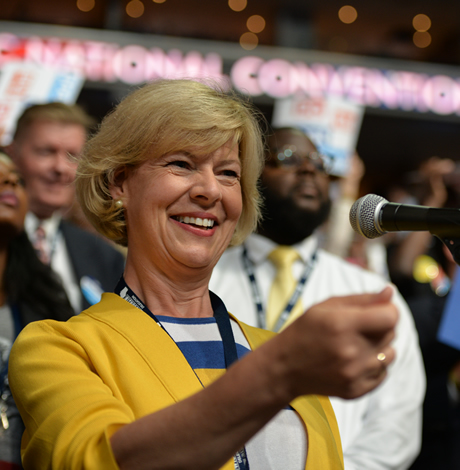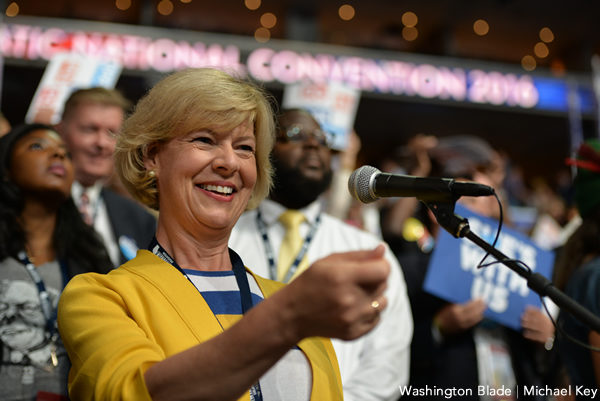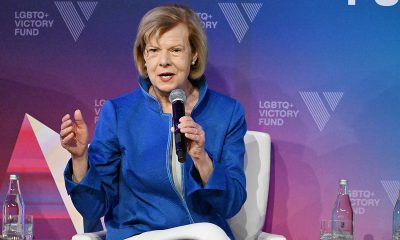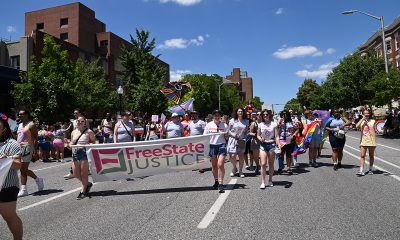News
Senate Dems take series of actions to assist LGBT youth, elders
Lawmakers call for reinstatement of survey questions, introduce LGBT elder legislation


Sen. Tammy Baldwin signed letters and introduced legislation aimed at helping LGBT youth and elders.
(Washington Blade file photo by Michael Key)
Senate Democrats took a series of actions Tuesday seeking to assist the LGBT community — one action for the LGBT youth, two others for LGBT elders — both of which are subgroups that have a history of unique challenges.
In a pair of letters dated Nov. 7, U.S. Sens. Robert Casey (D-Pa.), Tammy Baldwin (D-Wis.) and Patty Murray (D-Wash.) led 21 senators in calling on the Trump administration to ensure programs designed to combat youth homelessness reach LGBT people and include LGBT elders in health surveys.
Meanwhile, U.S. Sen. Michael Bennet (D-Colo.) — along with Sen. Jeff Merkley (D-Ore.), Edward Markey (D-Mass.) and Al Franken (D-Minn.) — introduced the LGBT Elder Americans Act, which seeks to improve services available for LGBT elders.
The letters, sent to both the U.S. Justice Department and the U.S. Department of Health & Human Services, bases its call to action on President Trump’s promise during his 2016 campaign to be a friend to LGBT people.
“During the campaign, President Trump said that he would ‘do everything in [his] power to protect LGBTQ citizens.’ We write to you because the administration is not living up to the president’s promise,” the senators wrote. “We urge you to reverse course on actions that will make it more challenging for programs you oversee to serve LGBTQ Americans.”
Specifically, the letter to the Justice Department expresses concern two federal grant programs that combat homelessness — DOJ’s Mentoring for Child Victims of Commercial Sexual Exploitation & Domestic Sex Trafficking Initiative and HHS’ Street Outreach Program — will no longer focus on LGBT youth because this year’s funding requirement “removed that requirement as well as all mentions of LGBTQ youth.”
“As LGBTQ youth are at a higher risk for running away and becoming homeless compared to their peers, and therefore more likely to be victimized, we are concerned about the effect these administration decisions would have on these vulnerable youth,” the letter says.
Meanwhile, the letter to the Department of Health & Human Services calls for restoration of questions allowing respondents to identify as transgender in the National Survey of Older Americans Act Participants as well as LGBT on the Centers for Independent Living Annual Program Performance Report. (HHS has previously removed the sexual-orientation question from the NSOAPP, but reinstated it under public pressure.)
“In order to ensure that key programs for older adults and people with disabilities are meeting the needs of the entire LGBTQ community, we once again reiterate our call for HHS to restore the gender-identity question to the NSOAPP and to collect information on sexual orientation and gender identity on the CILPPR,” the letter says.
Additionally, the letter expresses concern about the withdrawal of a proposed HHS rule that would have clarified same-sex spouses should are afforded equal rights in nursing homes that receive Medicare and Medicaid. That rule was widely seen as redundant after the U.S. Supreme Court ruling for marriage equality nationwide.
Neither the Justice Department, not the Department of Health & Human Services, responded to the Washington Blade’s request to comment on the letter.
Meanwhile, the LGBT Elder Americans Act, reintroduced by Bennet, would build on the Older Americans Act to include LGBT seniors as a vulnerable population and permanently establish the National Resource Center on LGBT Aging.
“Our laws and research are not current in addressing the unique needs of the aging generation of baby boomers,” Bennet said in a statement. “This legislation would provide LGBT seniors, who often face significant barriers to accessing health care, with targeted services and resources. By helping aging service organizations assist older LGBT adults and permanently establishing a National Resource Center, we will better meet the needs of the LGBT community.”
Baldwin, who’s running for re-election in the U.S. Senate next year and remains the only out lesbian in Congress, also emphasized the importance of the LGBT Elder Americans Act in a statement.
“We should guarantee all of our seniors access to the care that truly meets their needs and so I am proud to advance this legislation that will improve services and support for LGBT older adults,” Baldwin said. “Too many LGBT older adults carry the harmful physical and emotional health effects of having lived through a lifetime of discrimination. It is past time we do something about it and strengthen the Older Americans Act to better support our LGBT seniors.”
Last week, Rep. Suzanne Bonamici (D-Ore.) — along with Rep. Ted Deutch (D-Fla.) and Charlie Crist (D-Fla.) — introduced companion legislation in the U.S. House known as the Ruthie & Connie LGBT Elder Americans Act, named for two LGBT elders who continue to fight for LGBT equality.
Michael Adams, CEO of the LGBT elder group SAGE USA, commended the lawmakers for introducing the legislation in a statement.
“LGBT elders, whose courage in the face of danger and adversity paved the way for progress on LGBT equality in recent years, deserve to be taken care of as they age, no matter where in the United States they live,” Adams said. “Our LGBT elder pioneers did not lead the movement birthed at Stonewall by being silent. We at SAGE follow their example by raising our voices in support of the Ruthie & Connie LGBT Elder Americans Act of 2017 and to demand justice for this growing population.”
New York
Two teens shot steps from Stonewall Inn after NYC Pride parade
One of the victims remains in critical condition

On Sunday night, following the annual NYC Pride March, two girls were shot in Sheridan Square, feet away from the historic Stonewall Inn.
According to an NYPD report, the two girls, aged 16 and 17, were shot around 10:15 p.m. as Pride festivities began to wind down. The 16-year-old was struck in the head and, according to police sources, is said to be in critical condition, while the 17-year-old was said to be in stable condition.
The Washington Blade confirmed with the NYPD the details from the police reports and learned no arrests had been made as of noon Monday.
The shooting took place in the Greenwich Village neighborhood of Manhattan, mere feet away from the most famous gay bar in the city — if not the world — the Stonewall Inn. Earlier that day, hundreds of thousands of people marched down Christopher Street to celebrate 55 years of LGBTQ people standing up for their rights.
In June 1969, after police raided the Stonewall Inn, members of the LGBTQ community pushed back, sparking what became known as the Stonewall riots. Over the course of two days, LGBTQ New Yorkers protested the discriminatory policing of queer spaces across the city and mobilized to speak out — and throw bottles if need be — at officers attempting to suppress their existence.
The following year, LGBTQ people returned to the Stonewall Inn and marched through the same streets where queer New Yorkers had been arrested, marking the first “Gay Pride March” in history and declaring that LGBTQ people were not going anywhere.
New York State Assemblywoman Deborah Glick, whose district includes Greenwich Village, took to social media to comment on the shooting.
“After decades of peaceful Pride celebrations — this year gun fire and two people shot near the Stonewall Inn is a reminder that gun violence is everywhere,” the lesbian lawmaker said on X. “Guns are a problem despite the NRA BS.”
India
Anaya Bangar challenges ban on trans women in female cricket teams
Former Indian cricketer Sanjay Bangar’s daughter has received support

Anaya Bangar, the daughter of former Indian cricketer Sanjay Bangar, has partnered with the Manchester Metropolitan University Institute of Sport in the U.K. to assess her physiological profile following her gender-affirming surgery and undergoing hormone replacement therapy.
From January to March 2025, the 23-year-old underwent an eight-week research project that measured her glucose levels, oxygen uptake, muscle mass, strength, and endurance after extensive training.
The results, shared via Instagram, revealed her metrics align with those of cisgender female athletes, positioning her as eligible for women’s cricket under current scientific standards. Bangar’s findings challenge the International Cricket Council’s 2023 ban on transgender athletes in women’s cricket, prompting her to call for a science-based dialogue with the Board of Control for Cricket in India and the ICC to reform policies for transgender inclusion.
“I am talking with scientific evidence in my hand,” Bangar said in an interview posted to her Instagram page. “So, I hope, this makes an impact and I will be hoping to BCCI and ICC talking with me and discussing this further.”
On Nov. 21, 2023, the ICC enacted a controversial policy barring trans women from international women’s cricket. Finalized after a board meeting in Ahmedabad, India, the regulation prohibits any trans player who has experienced male puberty from competing, irrespective of gender-affirming surgery or hormone therapy. Developed through a 9-month consultation led by the ICC’s Medical Advisory Committee, the rule aims to safeguard the “integrity, safety, and fairness” of women’s cricket but has drawn criticism for excluding athletes like Canada’s Danielle McGahey, the first trans woman to play internationally. The policy, which allows domestic boards to set their own rules, is slated for review by November 2025.
Bangar shared a document on social media verifying her participation in a physiological study at the Manchester Metropolitan University Institute of Sport, conducted from Jan. 20 to March 3, 2025, focused on cricket performance. The report confirmed that her vital metrics — including haemoglobin, blood glucose, peak power, and mean power — aligned with those of cisgender female athletes. Initially, her fasting blood glucose measured 6.1 mmol/L, slightly above the typical non-diabetic range of 4.0–5.9 mmol/L, but subsequent tests showed it normalized, reinforcing the study’s findings that her physical profile meets female athletic standards.
“I am submitting this to the BCCI and ICC, with full transparency and hope,” said Bangar. “My only intention is to start a conversation based on facts not fear. To build space, not divide it.”
In a letter to the BCCI and the ICC, Bangar emphasized her test results from the Manchester Metropolitan University study. She explained that the research aimed to assess how hormone therapy had influenced her strength, stamina, haemoglobin, glucose levels, and overall performance, benchmarked directly against cisgender female athletic standards.
Bangar’s letter to the BCCI and the ICC clarified the Manchester study was not intended as a political statement but as a catalyst for a science-driven dialogue on fairness and inclusion in cricket. She emphasized the importance of prioritizing empirical data over assumptions to shape equitable policies for trans athletes in the sport.
Bangar urged the BCCI, the world’s most influential cricket authority, to initiate a formal dialogue on trans women’s inclusion in women’s cricket, rooted in medical science, performance metrics, and ethical fairness. She called for the exploration of eligibility pathways based on sport-specific criteria, such as haemoglobin thresholds, testosterone suppression timelines, and standardized performance testing. Additionally, she advocated for collaboration with experts, athletes, and legal advisors to develop policies that balance inclusivity with competitive integrity.
“I am releasing my report and story publicly not for sympathy, but for truth. Because inclusion does not mean ignoring fairness, it means measuring it, transparently and responsibly,” said Bangar in a letter to the BCCI. “I would deeply appreciate the opportunity to meet with you or a representative of the BCCI or ICC to present my findings, discuss possible policy pathways, and work towards a future where every athlete is evaluated based on real data, not outdated perceptions.”
Before her transition, Bangar competed for Islam Gymkhana in Mumbai and Hinckley Cricket Club in the U.K., showcasing her talent in domestic cricket circuits. Her father, Sanjay Bangar, was a dependable all-rounder for the Indian national cricket team from 2001 to 2004, playing 12 test matches and 15 One Day Internationals. He later served as a batting coach for the Indian team from 2014 to 2019, contributing to its strategic development.
Cricket in India is a cultural phenomenon, commanding a fanbase of more than 1 billion, with more than 80 percent of global cricket viewership originating from the country.
The International Cricket Council, the sport’s governing body, oversees 12 full member nations and more than 90 associate members, with the U.S. recently gaining associate member status in 2019 and co-hosting the 2024 ICC Men’s T20 World Cup. The BCCI generated approximately $2.25 billion in revenue in the 2023–24 financial year, primarily from the Indian Premier League, bilateral series, and ICC revenue sharing. The ICC earns over $3 billion from media rights in India alone for the 2024–27 cycle, contributing nearly 90 percent of its global media rights revenue, with the BCCI receiving 38.5 percent of the ICC’s annual earnings, approximately $231 million per year.
Women’s cricket in India enjoys a growing fanbase, with over 300 million viewers for the Women’s Premier League in 2024, making it a significant driver of the sport’s global popularity. The International Cricket Council oversees women’s cricket in 12 full member nations and over 90 associate members, with the U.S. fielding a women’s team since gaining associate status in 2019 and competing in ICC events like the 2024 Women’s T20 World Cup qualifiers. The BCCI invests heavily in women’s cricket, allocating approximately $60 million annually to the WPL and domestic programs in 2024–25, while contributing to the ICC’s $20 million budget for women’s cricket development globally. India’s media market for women’s cricket, including WPL broadcasting rights, generated $120 million in 2024, accounting for over 50 percent of the ICC’s women’s cricket media revenue.
“As a woman, I feel when someone says that they are women, then they are, be trans or cis. A trans woman is definitely the same as a cis woman emotionally and in vitals, and specially, when someone is on hormone replacement therapy. Stopping Anaya Bangar from playing is discrimination and violation of her rights. It is really sad and painful that every transwoman need to fight and prove their identity everywhere,” said Indrani Chakraborty, an LGBTQ rights activist and a mother of a trans woman. “If ICC and BCCI is stopping her from playing for being transgender, then I will say this to be their lack of awareness and of course the social mindsets which deny acceptance.”
Chakraborty told the Blade that Bangar is an asset, no matter what. She said that the women’s cricket team will only benefit by participation, but the discriminating policies are the hindrance.
“Actually the transgender community face such discrimination in every sphere. In spite of being potent, they face rejection. This is highly inhuman. These attitudes is regressive and will never let to prosper. Are we really in 2025?,” said Chakraborty. “We, our mindset and the society are the issues. We, as a whole, need to get aware and have to come together for getting justice for Anaya. If today, we remain silent, the entire community will be oppressed. Proper knowledge of gender issues need to be understood.”
The BCCI and the International Cricket Council have not responded to the Blade’s repeated requests for comment.
New York
Zohran Mamdani participates in NYC Pride parade
Mayoral candidate has detailed LGBTQ rights platform

Zohran Mamdani, the candidate for mayor of New York City who pulled a surprise victory in the primary contest last week, walked in the city’s Pride parade on Sunday.
The Democratic Socialist and New York State Assembly member published photos on social media with New York Attorney General Letitia James, telling followers it was “a joy to march in NYC Pride with the people’s champ” and to “see so many friends on this gorgeous day.”
“Happy Pride NYC,” he wrote, adding a rainbow emoji.
Mamdani’s platform includes a detailed plan for LGBTQ people who “across the United States are facing an increasingly hostile political environment.”
His campaign website explains: “New York City must be a refuge for LGBTQIA+ people, but private institutions in our own city have already started capitulating to Trump’s assault on trans rights.
“Meanwhile, the cost of living crisis confronting working class people across the city hits the LGBTQIA+ community particularly hard, with higher rates of unemployment and homelessness than the rest of the city.”
“The Mamdani administration will protect LGBTQIA+ New Yorkers by expanding and protecting gender-affirming care citywide, making NYC an LGBTQIA+ sanctuary city, and creating the Office of LGBTQIA+ Affairs.”
-

 U.S. Supreme Court4 days ago
U.S. Supreme Court4 days agoSupreme Court upholds ACA rule that makes PrEP, other preventative care free
-

 U.S. Supreme Court4 days ago
U.S. Supreme Court4 days agoSupreme Court rules parents must have option to opt children out of LGBTQ-specific lessons
-

 National5 days ago
National5 days agoEvan Wolfson on the 10-year legacy of marriage equality
-

 Congress5 days ago
Congress5 days agoSenate parliamentarian orders removal of gender-affirming care ban from GOP reconciliation bill












